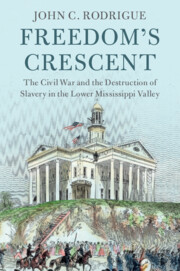Book contents
- Freedom’s Crescent
- Cambridge Studies on the American South
- Freedom’s Crescent
- Copyright page
- Dedication
- Epigraph
- Contents
- Figures
- Acknowledgments
- Abbreviations
- Additional material
- Introduction
- Prologue Life – and Labor – on the Mississippi
- Part I From War for Union to Military Emancipation, 1860–1862
- Part II From Military Emancipation to State Abolition, 1863
- Part III Abolition: State and Federal, 1864
- Part IV The Destruction of Slavery, 1865
- 18 “The Tyrants Rod Has Been Broken”
- 19 “This Cup of Liberty”
- 20 “Establish Things as They Were Before the War”
- 21 “The Institution of Slavery Having Been Destroyed”
- 22 “Americans in America, One and Indivisible”
- Epilogue Memphis and New Orleans: May 1–3 and July 30, 1866
- Bibliography
- Index
18 - “The Tyrants Rod Has Been Broken”
from Part IV - The Destruction of Slavery, 1865
Published online by Cambridge University Press: 19 January 2023
- Freedom’s Crescent
- Cambridge Studies on the American South
- Freedom’s Crescent
- Copyright page
- Dedication
- Epigraph
- Contents
- Figures
- Acknowledgments
- Abbreviations
- Additional material
- Introduction
- Prologue Life – and Labor – on the Mississippi
- Part I From War for Union to Military Emancipation, 1860–1862
- Part II From Military Emancipation to State Abolition, 1863
- Part III Abolition: State and Federal, 1864
- Part IV The Destruction of Slavery, 1865
- 18 “The Tyrants Rod Has Been Broken”
- 19 “This Cup of Liberty”
- 20 “Establish Things as They Were Before the War”
- 21 “The Institution of Slavery Having Been Destroyed”
- 22 “Americans in America, One and Indivisible”
- Epilogue Memphis and New Orleans: May 1–3 and July 30, 1866
- Bibliography
- Index
Summary
With reelection secure, Lincoln calls for US House approval of Thirteenth Amendment, and campaign launched in early 1865 to win passage. Lincoln also suggests Reconstruction policy may change when war is over, and efforts to enact Reconstruction legislation is revived. Black political convention in New Orleans in January 1865 calls for political and legal equality, but also reveals tensions within free black community. Tennessee convention, although contentious, drafts amendments to state constitution abolishing slavery and creating loyalist government, but refuses to implement racial equality, despite petition from black Tennesseans. US House passes Thirteenth Amendment in late January.
- Type
- Chapter
- Information
- Freedom's CrescentThe Civil War and the Destruction of Slavery in the Lower Mississippi Valley, pp. 359 - 376Publisher: Cambridge University PressPrint publication year: 2023

